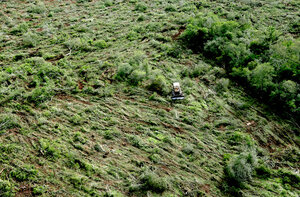Clean forestry as a social yardstick
A court halts illegal logging in Argentina, citing alleged corruption – and the need for integrity in governance.

A bulldozer in Formosa, Argentina, removes trees from a forested area in the Gran Chaco last year.
Reuters
A vast woodland at the heart of South America called the Gran Chaco is home to a dizzying diversity of plants and animals as well as humans who have long relied on its abundance. It also has one of the world’s highest rates of deforestation. Now this wilderness, which stretches across four countries, is attracting interest for something else: a court ruling aimed at saving the integrity of the forest in order to save the integrity of human society, especially its most vulnerable.
On Monday, a judge in Argentina temporarily suspended all logging activity in the Gran Chaco area within that country’s borders. A final ruling awaits an investigation into an alleged corruption scheme involving government officials and timber companies. Yet even in her initial ruling, Judge Zunilda Niremperger noted this reason for the suspension: “The felling of a tree could mean not only harm to the global environment. ... Environmental damage has specific relevance for indigenous peoples, children, people living in poverty, people with disabilities, minorities, and the differentiated impact it has on women.”
Worldwide, forests are shrinking annually by an area roughly equivalent to the size of Ohio. Roughly half of global deforestation results from illegal logging, a highly profitable crime that requires bribery at almost every link in the supply chain from timberlands to lumberyards.
In recent decades, global measures to label the origin of forestry products have helped importers to at least identify illicit supplies more easily. Now, however, the urgency of climate change is driving more cooperation to address what’s sometimes known as green corruption with greater transparency. Earlier this year, for the first time, the annual conference of countries that have signed on to the United Nations Convention Against Corruption focused on environmental crime.
That focus on firming up a norm of honesty in forestry coincides with trends shaping the world’s response to climate change. Global agencies are supporting local investigations of forestry corruption in countries such as Ghana, Indonesia, and Ukraine. Similar efforts are sharpening scrutiny of graft in the mining of metals.
Tackling climate-related corruption, according to Transparency International, is a way to ensure that governments are held accountable, allow broad public participation in decision-making, and release official data.
In her ruling, the judge in Argentina has put the focus on the way to sustain a forest for all forms of life that live off it. Trees are not just about clean air. They are also a living indicator of honest governance.

